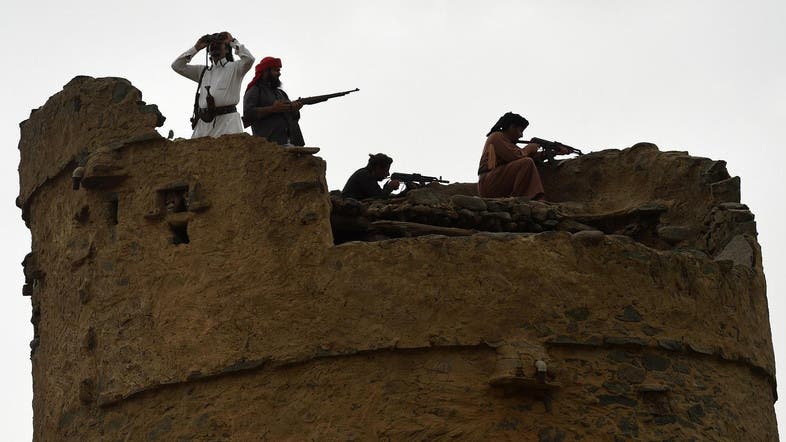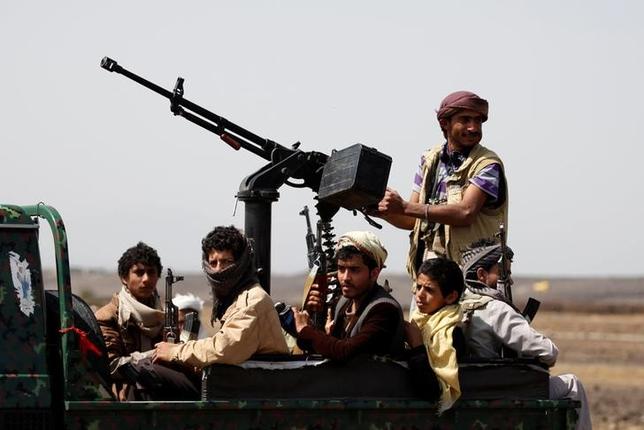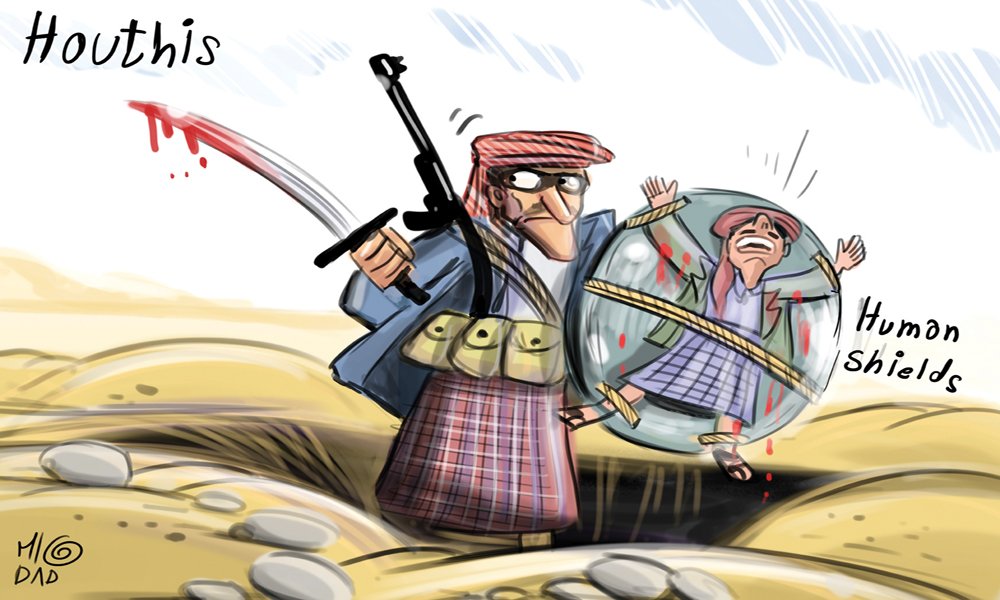You are using an out of date browser. It may not display this or other websites correctly.
You should upgrade or use an alternative browser.
You should upgrade or use an alternative browser.
Yemen - Civil War
- Thread starter Falcon29
- Start date
BLACKEAGLE
SENIOR MEMBER
Coalition air strikes hit Al-Qaeda in new Yemen offensive
Agence France Presse | Published — Saturday 23 July 2016

ADEN: Saudi-led coalition warplanes struck Al-Qaeda positions in southern Yemen on Saturday killing several extremist fighters as government forces appeared set on a new offensive, military officials said.
Two air strikes targeted Al-Qaeda militants gathered on the outskirts of Jaar town in Abyan province, killing and wounding several militants, military officials said.
The raids came after several military meetings were held in Aden to discuss plans for a new operation against jihadists in Abyan, they added.
Government forces backed by the Arab coalition had launched an all-out offensive in March against the extremists in south Yemen, recapturing main cities.
But government troops retreated from Zinjibar, the provincial capital of Abyan, after Al-Qaeda militants struck back.
The jihadists have been seen planting mines and explosive devices along the route linking Abyan with the southern port city of Aden, in preparation for an anticipated attack, witnesses said.
The government of UN-backed President Abedrabbo Mansour Hadi has been using Aden as a temporary capital since it was recaptured from Shiite Houthi rebels a year ago. The capital Sanaa has been under rebel control since September 2014.
The coalition intervened in March last year when the rebels closed in on Hadi’s refuge in Aden, forcing him to flee to Riyadh. But it has since turned its firepower against the Al Qaeda, who have posed a serious challenge to Hadi’s authority in the south.
Three months of talks between the government and the Iran-backed Houthis rebels in Kuwait have failed to make headway, forcing the host country to issue an ultimatum Wednesday for the warring parties to reach a deal within 15 days or leave.
Meanwhile, suspected militants of the Daesh group killed a Sunni cleric in the center of Aden on Saturday, a security official said.
A gunman stepped out of a car after dawn and shot dead cleric Ali Abdulrahman Al-Zahri in Mansura district, as he emerged from a mosque, the official said.
Daesh militants had threatened attacks against clerics they accuse of being pro-government, mainly those who denounce suicide bombings.
http://www.arabnews.com/node/958436/middle-east
Agence France Presse | Published — Saturday 23 July 2016

ADEN: Saudi-led coalition warplanes struck Al-Qaeda positions in southern Yemen on Saturday killing several extremist fighters as government forces appeared set on a new offensive, military officials said.
Two air strikes targeted Al-Qaeda militants gathered on the outskirts of Jaar town in Abyan province, killing and wounding several militants, military officials said.
The raids came after several military meetings were held in Aden to discuss plans for a new operation against jihadists in Abyan, they added.
Government forces backed by the Arab coalition had launched an all-out offensive in March against the extremists in south Yemen, recapturing main cities.
But government troops retreated from Zinjibar, the provincial capital of Abyan, after Al-Qaeda militants struck back.
The jihadists have been seen planting mines and explosive devices along the route linking Abyan with the southern port city of Aden, in preparation for an anticipated attack, witnesses said.
The government of UN-backed President Abedrabbo Mansour Hadi has been using Aden as a temporary capital since it was recaptured from Shiite Houthi rebels a year ago. The capital Sanaa has been under rebel control since September 2014.
The coalition intervened in March last year when the rebels closed in on Hadi’s refuge in Aden, forcing him to flee to Riyadh. But it has since turned its firepower against the Al Qaeda, who have posed a serious challenge to Hadi’s authority in the south.
Three months of talks between the government and the Iran-backed Houthis rebels in Kuwait have failed to make headway, forcing the host country to issue an ultimatum Wednesday for the warring parties to reach a deal within 15 days or leave.
Meanwhile, suspected militants of the Daesh group killed a Sunni cleric in the center of Aden on Saturday, a security official said.
A gunman stepped out of a car after dawn and shot dead cleric Ali Abdulrahman Al-Zahri in Mansura district, as he emerged from a mosque, the official said.
Daesh militants had threatened attacks against clerics they accuse of being pro-government, mainly those who denounce suicide bombings.
http://www.arabnews.com/node/958436/middle-east
BLACKEAGLE
SENIOR MEMBER
BLACKEAGLE
SENIOR MEMBER
BLACKEAGLE
SENIOR MEMBER
Saudi UN envoy decries Houthi border attacks

Nearly 500 Saudi citizens have died in cross-border attacks by Houthi militias, according to Saudi-UN envoy Abdallah al-Moallimi. (File photo: AFP)
Staff writer, Al Arabiya English Wednesday, 3 August 2016
Saudi Arabia's Ambassador to the United Nations Abdallah al-Moallimi has said that nearly 500 Saudi citizens were killed following 1700 border attacks by Houthi militias.
Moallimi noted the difference between the militias and Saudi-led coalition forces, who view all areas of Yemen as civilian populated areas.
The envoy’s comments came during a Security Council meeting where it was announced that the Saudi-led Arab coalition was removed from a blacklist of those causing the deaths of hundreds of children in Yemen.
The United Nations also requested to verify the information and sources and of their recent reports, noting that Saudi Arabia continues to provide aid for Yemeni refugees as well as the provision of humanitarian assistance in all parts of Yemen.
The Saudi-led coalition includes United Arab Emirates, Bahrain, Kuwait, Qatar, Egypt, Jordan, Morocco, Senegal and Sudan.
Last Update: Wednesday, 3 August 2016 KSA 08:04 - GMT 05:04
http://english.alarabiya.net/en/New...i-UN-envoy-decries-Houthi-border-attacks.html

Nearly 500 Saudi citizens have died in cross-border attacks by Houthi militias, according to Saudi-UN envoy Abdallah al-Moallimi. (File photo: AFP)
Staff writer, Al Arabiya English Wednesday, 3 August 2016
Saudi Arabia's Ambassador to the United Nations Abdallah al-Moallimi has said that nearly 500 Saudi citizens were killed following 1700 border attacks by Houthi militias.
Moallimi noted the difference between the militias and Saudi-led coalition forces, who view all areas of Yemen as civilian populated areas.
The envoy’s comments came during a Security Council meeting where it was announced that the Saudi-led Arab coalition was removed from a blacklist of those causing the deaths of hundreds of children in Yemen.
The United Nations also requested to verify the information and sources and of their recent reports, noting that Saudi Arabia continues to provide aid for Yemeni refugees as well as the provision of humanitarian assistance in all parts of Yemen.
The Saudi-led coalition includes United Arab Emirates, Bahrain, Kuwait, Qatar, Egypt, Jordan, Morocco, Senegal and Sudan.
Last Update: Wednesday, 3 August 2016 KSA 08:04 - GMT 05:04
http://english.alarabiya.net/en/New...i-UN-envoy-decries-Houthi-border-attacks.html
BLACKEAGLE
SENIOR MEMBER
BLACKEAGLE
SENIOR MEMBER
Exclusive: U.N. report on Yemen says Houthis used human shields, Islamic State got cash
UNITED NATIONS | By Michelle Nichols

Houthi fighters ride on the back of a patrol truck as they secure the site of a pro-Houthi tribal gathering in a rural area near Sanaa, Yemen July 21, 2016.
Reuters/Khaled Abdullah
Yemen's Houthi rebels used civilians as human shields, Islamic State militants in the country received an influx of cash and al Qaeda has improved its roadside bombs, according to a confidential report by United Nations experts monitoring sanctions on Yemen.
The 105-page report to the U.N. Security Council, seen by Reuters on Thursday, also said a military coalition led by Saudi Arabia had violated international humanitarian law by bombing a civilian home in Al-Mahala village in May, and the monitors were investigating three other cases in which civilians were bombed.
The midterm report covered the past six months. The experts noted that they have been unable to travel to the Arabian Peninsula country so they gathered information remotely.
"The panel has documented violations of international humanitarian law and international human rights law committed by the Houthi-Saleh forces, the Saudi Arabia-led coalition and forces affiliated to the legitimate Government of Yemen," the panel said in the report. Saudi Arabia has said it is committed to international humanitarian law.
The mostly Sunni Arab alliance intervened in Yemen's civil war in March last year to support the government and fight forces loyal to ex-President Ali Abdullah Saleh and the Houthi movement, which it has accused of being a proxy for Shiite arch-rival Iran.
The report on the implementation of an arms embargo and targeted sanctions on Saleh and four Houthi leaders has been submitted to the 15-member U.N. Security Council sanctions committee. The Security Council imposed an arms embargo on Houthi rebels and soldiers loyal to Saleh in April 2015.
Being put on the U.N. blacklist triggers a travel ban and asset freeze.
The U.N. sanctions committee will use information from the expert panel to decide if additional people or groups should be blacklisted for "engaging in or providing support for acts that threaten the peace, security or stability of Yemen."
A Saudi-led coalition investigation into air strikes on markets, clinics and a wedding in Yemen on Thursday largely defended the attacks on the grounds that armed militias were at the sites.
The U.N. report said the Houthis had concealed fighters and equipment in or close to civilians in Al Mukha in the Taiz Governorate "with the deliberate aim of avoiding attack" and in violation of international humanitarian law.
The report said the Houthis had diverted about $100 million a month from Yemen's central bank to support the group's war effort and that the foreign reserves of the central bank had dropped to $1.3 billion in June 2016 from $4.6 billion in November 2014.
Political and central bank sources have said the Houthis were likely to have received more central bank cash for their troops than the government because when they seized Sanaa thousands of their militiamen were added to army rosters and became entitled to state pay.
The Houthis were not immediately available to comment on the report.
TUG O' WAR FOR LAND, RECRUITS
Al Qaeda in the Arabian Peninsula (AQAP) has taken advantage of Yemen's civil war to take over parts of southern and eastern Yemen, and the militant group Islamic State has also gained a foothold in the country.
The two groups' are now "undermining one another as they compete for recruits," the report said, adding that in March and April 2016 "ISIL received a significant influx of cash in Yemen, which it is using to attract recruits, finance operations, and purchase equipment." The report, using an acronym for Islamic State, did not specify the source of the money.
The report said that from a technical perspective, AQAP's operational capability had improved, evidenced by advanced improvised explosive device (IED) designs it was now using in Yemen. The group also boasts one of the world's most feared bomb makers, Ibrahim Hassan al-Asiri.
The monitors said AQAP also likely had access to more reliable commercial electronic detonators, making it capable of implementing a sustained IED campaign.
The U.N. experts said that so far in 2016 there had been three seizures of weapons in the Arabian Sea and the Gulf of Aden, which they were investigating to see if the arms embargo had been violated.
The report said that during a seizure of weapons from a stateless dhow on Sept. 25, 2015, communications equipment, including mobile and satellite telephones, was found and inspected.
It said one member state, which was not identified in the report, had analyzed the communications traffic and found that in the month leading to the seizure most of the calls had come from the same Iranian number. Iran has denied providing material support to the Houthis.
(Reporting by Michelle Nichols; Additonal reporting by Noah Browning in Dubai; Editing by Yara Bayoumy, Toni Reinhold)
http://www.reuters.com/article/us-y...=topNews&utm_source=twitter&utm_medium=Social
UNITED NATIONS | By Michelle Nichols
Houthi fighters ride on the back of a patrol truck as they secure the site of a pro-Houthi tribal gathering in a rural area near Sanaa, Yemen July 21, 2016.
Reuters/Khaled Abdullah
Yemen's Houthi rebels used civilians as human shields, Islamic State militants in the country received an influx of cash and al Qaeda has improved its roadside bombs, according to a confidential report by United Nations experts monitoring sanctions on Yemen.
The 105-page report to the U.N. Security Council, seen by Reuters on Thursday, also said a military coalition led by Saudi Arabia had violated international humanitarian law by bombing a civilian home in Al-Mahala village in May, and the monitors were investigating three other cases in which civilians were bombed.
The midterm report covered the past six months. The experts noted that they have been unable to travel to the Arabian Peninsula country so they gathered information remotely.
"The panel has documented violations of international humanitarian law and international human rights law committed by the Houthi-Saleh forces, the Saudi Arabia-led coalition and forces affiliated to the legitimate Government of Yemen," the panel said in the report. Saudi Arabia has said it is committed to international humanitarian law.
The mostly Sunni Arab alliance intervened in Yemen's civil war in March last year to support the government and fight forces loyal to ex-President Ali Abdullah Saleh and the Houthi movement, which it has accused of being a proxy for Shiite arch-rival Iran.
The report on the implementation of an arms embargo and targeted sanctions on Saleh and four Houthi leaders has been submitted to the 15-member U.N. Security Council sanctions committee. The Security Council imposed an arms embargo on Houthi rebels and soldiers loyal to Saleh in April 2015.
Being put on the U.N. blacklist triggers a travel ban and asset freeze.
The U.N. sanctions committee will use information from the expert panel to decide if additional people or groups should be blacklisted for "engaging in or providing support for acts that threaten the peace, security or stability of Yemen."
A Saudi-led coalition investigation into air strikes on markets, clinics and a wedding in Yemen on Thursday largely defended the attacks on the grounds that armed militias were at the sites.
The U.N. report said the Houthis had concealed fighters and equipment in or close to civilians in Al Mukha in the Taiz Governorate "with the deliberate aim of avoiding attack" and in violation of international humanitarian law.
The report said the Houthis had diverted about $100 million a month from Yemen's central bank to support the group's war effort and that the foreign reserves of the central bank had dropped to $1.3 billion in June 2016 from $4.6 billion in November 2014.
Political and central bank sources have said the Houthis were likely to have received more central bank cash for their troops than the government because when they seized Sanaa thousands of their militiamen were added to army rosters and became entitled to state pay.
The Houthis were not immediately available to comment on the report.
TUG O' WAR FOR LAND, RECRUITS
Al Qaeda in the Arabian Peninsula (AQAP) has taken advantage of Yemen's civil war to take over parts of southern and eastern Yemen, and the militant group Islamic State has also gained a foothold in the country.
The two groups' are now "undermining one another as they compete for recruits," the report said, adding that in March and April 2016 "ISIL received a significant influx of cash in Yemen, which it is using to attract recruits, finance operations, and purchase equipment." The report, using an acronym for Islamic State, did not specify the source of the money.
The report said that from a technical perspective, AQAP's operational capability had improved, evidenced by advanced improvised explosive device (IED) designs it was now using in Yemen. The group also boasts one of the world's most feared bomb makers, Ibrahim Hassan al-Asiri.
The monitors said AQAP also likely had access to more reliable commercial electronic detonators, making it capable of implementing a sustained IED campaign.
The U.N. experts said that so far in 2016 there had been three seizures of weapons in the Arabian Sea and the Gulf of Aden, which they were investigating to see if the arms embargo had been violated.
The report said that during a seizure of weapons from a stateless dhow on Sept. 25, 2015, communications equipment, including mobile and satellite telephones, was found and inspected.
It said one member state, which was not identified in the report, had analyzed the communications traffic and found that in the month leading to the seizure most of the calls had come from the same Iranian number. Iran has denied providing material support to the Houthis.
(Reporting by Michelle Nichols; Additonal reporting by Noah Browning in Dubai; Editing by Yara Bayoumy, Toni Reinhold)
http://www.reuters.com/article/us-y...=topNews&utm_source=twitter&utm_medium=Social
BLACKEAGLE
SENIOR MEMBER
BLACKEAGLE
SENIOR MEMBER

That explains the Saudi Arabian ambassodr tour to Africa!
BLACKEAGLE
SENIOR MEMBER

